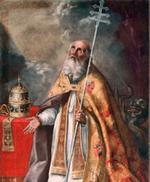Fathers of the Church
Letter LXXXV: to Paulinus
by Jerome in 400 | translated by W. H. Fremantle, M.A., G. Lewis, M.A., W. G. Martley, M.A
1. Your words urge me to write to you but your eloquence deters me from doing so. For as a letter-writer you are almost as good as Tully. You complain that my letters are short and unpolished: this is not due to carelessness but to fear of you, lest writing to you at greater length I should but send you more sentences to find fault with. Moreover, to make a clean breast of it to a good man like you, just about the time the vessels sail for the west, so many letters are demanded of me at once that, if I were to reply to all my correspondents, I should be unable to accomplish my task. Hence it happens that, neglecting the niceties of composition and not revising the work of my secretaries, I dictate whatever first comes into my head. Thus when I write to you I regard you as a friend and not as a critic.
2. Your letter propounds two questions, the first, why God hardened Pharaoh's heart, and why the apostle said: "So then it is not of him that willeth, nor of him that runneth, but of God that sheweth mercy;" and other things which appear to do away with free will: the second, how those are holy who are born of believing, that is, of baptized parents, seeing that without the gift of grace afterwards received and kept they cannot be saved.
3. Your first question is most ably answered by Origen in his treatise on First Principles which, at the request of my friend Pammachius, I have recently translated. This task has occupied me so fully that I am unable to keep my word with you and must again postpone the sending my commentary on Daniel. Indeed, distinguished and devoted to me as Pammachius is, had he been alone in his request, I should have deferred it to another time, but, as it was, almost all our brothers at Rome urged the same demand declaring that many persons were in danger, and that some even accepted Origen's heretical teaching. I have found myself forced therefore to translate a book in which there is more of bad than of good, and to keep to this rule that I should neither add nor subtract but should preserve in Latin in its integrity the true sense of the Greek. You will be able to borrow a copy of my version from the aforesaid brother, though in your case the Greek will serve quite as well neither should you, who can drink from the fountain head, turn to the muddy streamlets supplied by my poor wits.
4. Moreover, as I am speaking to an educated man, well versed both in the sacred scriptures and in secular literature, I desire to give your excellency this note of warning. Do not suppose that I am a clumsy buffoon who condemn everything that Origen has written,—as his injudicious friends falsely assert—or that I have changed my mind as suddenly as the philosopher Dionysius. The fact is that I repudiate merely his objectionable dogmas. For I know that one curse hangs over those who call evil good and over those who call good evil, over those who put bitter for sweet, and over those who put sweet for bitter. Who would go so far in praise of another man's teaching as to acquiesce in blasphemy?
5. Your second question is discussed by Tertullian in his books an Monogamy where he declares that the children of believers are l called holy because they are as it were candidates for the faith and have suffered no pollution from idolatry. Consider also that the vessels of which we read in the tabernacle are called holy and everything else required for the ceremonial worship: although in strictness of speech there can be nothing holy except creatures which know of and worship God. But it is a scriptural usage sometimes to give the name of holy to those who are clean, or who have been purified, or who have made expiation. For instance, it is written of Bathsheba that she was made holy from her uncleanness, and the temple itself is called the holy place.
6. I beg that you will not silently in your mind accuse me either of vanity or of insincerity. God bears me witness in my conscience that the unavoidable circumstances mentioned above drew me back when I was just going to grapple with my commentary; and you know that what is done when the mind is pre-occupied is never well done. I gladly accept the cap that you have sent me, a mark, though small, of no small affection and just the thing to keep an old man's head warm. I am delighted alike with the gift and with the giver.
Taken from "The Early Church Fathers and Other Works" originally published by Wm. B. Eerdmans Pub. Co. in English in Edinburgh, Scotland, beginning in 1867. (PNPF II/VI, Schaff and Wace). The digital version is by The Electronic Bible Society, P.O. Box 701356, Dallas, TX 75370, 214-407-WORD.






